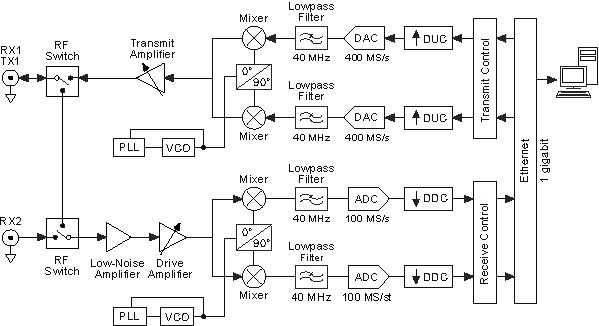- Table of contents
- 2.2 Universal Software Radio Peripheral
2.2 Universal Software Radio Peripheral¶
The SDR used for this simulation is the NI USRP 2920 (Figure 2.3). USRPs (Universal Software Radio Peripheral) are designed by Ettus Research http://www.ettus.com and its parent company National Instruments (NI).

Figure 2.3 NI USRP2920
In Figure 2.4 we present the NI USRP 2920 schematic and in Table 2.1 its specifications.

Figure 2.4 NI USRP2920 Schematic
2.2.1 Accuracy¶
Frequency accuracy $f_a$ is given in parts per million (ppm) of the sample rate and is a good example of the pricision dynamics of the USRP. Frequency accuracy $f_a$, frequency error $f_e$ and the signal frequency are related with the following formulas $f_m=f_s \pm f_e=f_s/(1 \pm fa) \Rightarrow f_e=f_s*f_a$. Considering this for a $100KHz$ sine wave with $2.5ppm$ we have $fe=0.25Hz$ and therefore frequency accuracy of $100KHz \pm 0.25Hz$ which proves the high performance that can be attained with USRP2920. The USRP 2920 offers MIMO Expansion Connectivity for synchronized data transfer through the Ethernet Gb connection allowing TX - RX simulation with two USRPs. The RF signal output TX1 is connected to the RF signal input RX1 of each USRP through SMA (SubMiniature version A) cohexial RF connector with use of a $30dB$ SMA attenuator for power safety.
2.2.2 NI USRP 2920 Specifications¶
| Table 2.1 Specifications | |
| Frequency Range | 50MHz-2.2GHz |
| Frequency Accuracy | 2.5ppm |
| Frequncy Step | <1kHz |
| Noise Figure | 5-7dB |
| Maximum Bandwidth(16bit sampling) | 20MHz |
| Maximum IQ sampling rate(16bit) | 25MS/s |
| Max output Power | 15dBm-20dBm |
| Max input Power | 0dBm |
| Ethernet connection | 1 Gigabyte |
